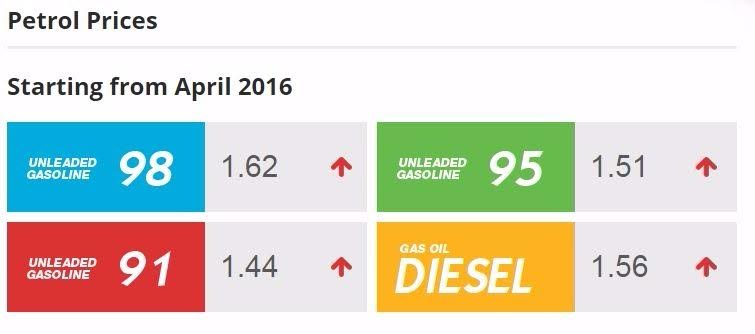- City Fajr Shuruq Duhr Asr Magrib Isha
- Dubai 04:07 05:29 12:18 15:42 19:01 20:24

Mirroring the rise in the global price of crude oil, the UAE has announced a hike in the retail price of petrol for the first time in eight months.
‘Special’ grade petrol (95 octane) will retail at Dh1.51 per litre from April 1, up 11 per cent from the Dh1.36 per litre that UAE residents currently pay for it.
On the other hand, Super (98 octane) grade of petrol will retail at Dh1.62 per litre from next month, up 10.2 per cent from the current Dh1.47 per litre.
The price of E Plus gasoline (91 octane), the least expensive petrol in the country, has been set at Dh1.44 per litre, up 11.62 per cent from the current Dh1.29 per litre.
Diesel, which currently retails for Dh1.40 per litre, will retail at Dh1.56 from April 1, a jump of 11.42 per cent.
Even after the hike, the price of petrol will remain less than what it was prior to its deregulation last year. ‘Special’ 95, for instance, will still be 12.2 per cent less expensive in April 2016 than it was in July 2015.
|
UAE’s Fuel Price Evolution Since Deregulation |
||||
|
|
Super 98 |
Special 95 |
E Plus 91 |
Diesel |
|
April |
1.62 |
1.51 |
1.44 |
1.56 |
|
March |
1.47 |
1.36 |
1.29 |
1.40 |
|
February |
1.58 |
1.47 |
1.40 |
1.37 |
|
January |
1.69 |
1.58 |
1.51 |
1.61 |
|
December ’15 |
1.79 |
1.68 |
1.61 |
1.83 |
|
November ’15 |
1.81 |
1.70 |
1.63 |
1.87 |
|
October ’15 |
1.90 |
1.79 |
1.72 |
1.89 |
|
September ’15 |
2.07 |
1.96 |
1.89 |
1.86 |
|
August ’15 |
2.25 |
2.14 |
2.07 |
2.05 |
|
Pre-Deregulation |
||||
|
July ’15 |
1.83 |
1.72 |
1.61 |
2.90 |
Source: Ministry of Energy; Prices in AED
In July 2015, the UAE’s Ministry of Energy announced the end of the era of subsidised petrol and diesel prices, signalling the dawn of the age of fuel price deregulation, starting August 1, 2015.
In line with the liberalisation of fuel prices (diesel and petrol), the Ministry now determines and announces the prices for the forthcoming month on the 28th of every month, with the said prices becoming effective from the first midnight of the next month.
The price of a litre of ‘Special’ grade petrol (95 octane) stood at Dh1.72 until July 31, 2015, before the UAE deregulated retail fuel prices.
In August 2015, the price of ‘Special’ petrol shot up 24.4 per cent to Dh2.14 per litre, but successive declines over the next seven months brought the price down 36.4 per cent to Dh1.36 per litre in March 2016.
Super (98 octane) grade of petrol went down to Dh1.47 per litre in March 2016, down 34.6 per cent from Dh2.25 per litre in August 2015.
The price of diesel has been the biggest beneficiary of the UAE’s fuel price liberalisation, with a litre of diesel, which cost up to Dh2.90 in Dubai and the Northern emirates before August 2015, sinking to less than half at Dh1.40 in March 2016 – a decline of 51 per cent in seven months.
Now, after several months of sluggish global crude prices bringing the prices down by more than a third, the UAE’s retail petrol and diesel prices have seen their first move up in eight months.
In July last year, while announcing the end of petrol price subsidy, Suhail Al Mazroui, Minister of Energy, said that a fuel price committee had been set up to review fuel prices against average international levels prior to their implementation in the UAE every month.
Al Mazroui highlighted that the decision to deregulate fuel prices was based on in-depth studies that demonstrated its long-term economic, social and environmental impact.
“The resolution is in line with the strategic vision of the UAE government in diversifying sources of income, strengthening the economy and increasing its competitiveness in addition to building a strong economy that is not dependent on government subsidies.
“This step will put the UAE on par with countries that follow sound economic methodologies.
“It is also anticipated to improve the UAE’s competitiveness while positioning the nation on international indices,” he’d then said.
Until August 2015, petrol and diesel prices in the country were heavily subsidised by the government.
In the run up to last year’s deregulation announcement, several international agencies including the International Monetary Fund (IMF), the World Bank and think tanks such as the Economist Intelligence Unit (EIU) had advised the UAE and other Gulf countries to do away with or at least reduce energy subsidies in order to support their respective budgets as well as increase fuel efficiency.
The ministry’s move to deregulate the fuel price last year came as per a decision issued by the UAE Cabinet based on a study submitted by the ministry.
Yesterday, Dr. Matar Al Nyadi, Undersecretary of the Ministry of Energy and Chairman of the Gasoline and Diesel Prices Committee, hinted in a tweet that the improvement in global oil prices was bound to push the UAE’s retail petrol prices higher.
Dr. Al Nyadi had earlier highlighted that, as the government’s representatives in the committee, the role of the Ministry of Energy and Ministry of Finance is to focus on consumer protection and ensure that petrol prices are balanced according to international standards.
![]() Follow Emirates 24|7 on Google News.
Follow Emirates 24|7 on Google News.